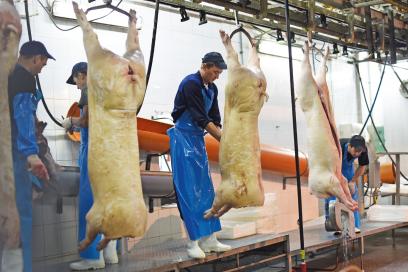NPA labour access concerns shared across the economy - MAC report
29th Mar 2018 / By Alistair Driver
The pig sector’s concerns over the Government’s post-Brexit immigration policy are shared across the national economy, according to a report published this week.
 The fears were outlined in an interim report by the Migration Advisory Committee (MAC), which has been commissioned by Home Secretary Amber Rudd to provide evidence to inform the Government’s post-Brexit immigration strategy. It has taken evidence more than 400 organisations and businesses, including the NPA, which is quoted in various places in the report.
The fears were outlined in an interim report by the Migration Advisory Committee (MAC), which has been commissioned by Home Secretary Amber Rudd to provide evidence to inform the Government’s post-Brexit immigration strategy. It has taken evidence more than 400 organisations and businesses, including the NPA, which is quoted in various places in the report.
This includes a reference in the NPA's evicdence to a recent AHDB Brexit scenario analysis, which demonstrated that, ‘unless specific policy measures are implemented to address the shortfall in migrant labour, its short supply will add a major cost to farms’. This could, in turn, compromise the competitiveness of British pork on the global market.
The report also quotes the NPA’s explanation of why migrant workers are often very attractive to pig sector employers. “Many people living in these countries have grown up with or are connected to agriculture, don’t have an issue with the type of work, and are keen to come and work here where opportunities at home have been lacking. They have provided a welcome solution to the historic issue, predominantly in stockman roles, or on the line in abattoirs.”
The MAC report showed that agriculture (9%) and food and drink sectors (24%) accounted for one-third of migrant labour from the European Economic Area (EEA) and noted that most employers in agriculture ‘see little alternative to migrant labour’. “Some respondents cited inability to automate as the key issue, others cited issues with hiring domestic workers due to unwillingness to work unsociable hours, and different work ethics,” it said.
It said employers across the economy are ‘fearful’ about the prospect of restrictions on recruiting EEA migrants, but said this was ‘unsurprising, seeing such restrictions as likely to make a hard job even harder’. However, it added: “The views of business are important but they should not be the only analysis to be considered.”
The report noted that many businesses do not seem well-prepared for a tighter labour supply and warned that lower migration ‘would very likely lead to lower growth in total employment, and lower output growth’.
The committee did not make policy recommendations ahead of its final report in September.
NPA response
NPA senior policy advisor Ed Barker welcomed the interim update, which gives an indication of current thinking ahead of the MAC’s final report.
He said: “It is clear that many sectors of the UK economy share the same concerns and fears as the pig sector with regards to the labour market. We are pleased that the Committee has taken our concerns seriously that a shortfall in available labour would have a serious impact on competitiveness, leading to increased costs for producers and consumers in pork.
“This will be investigated in their final report, though AHDB analysis has already stated this to be the case.
“We hope the Government will take note of this interim report and takes account of the need for the UK to be open to European migrant workers, who have fulfilled a shortfall in labour since 2004. Their contribution to the pig sector has been invaluable, and with so much uncertainty over competitiveness post-Brexit, access to labour from abroad must remain, alongside workers from the UK.”
Change 'unskilled' definition
The NPA also urged the MAC to recommend a change to the term ‘low-skilled’ labour in relation to the pig sector. The report confirms that fears about the future migration system were particularly pronounced in ‘lower-skilled sectors’, where many workers would not be eligible under the existing Tier 2 system under the Government’s post-Brexit plans.
The committee wrongly suggested the NPA accepts the term ‘low-skilled’, despite quoting evidence stating our belief that ‘unskilled does not mean ‘not skilled’; animal husbandry clearly requires a high degree of technical skill, but many roles do not require graduate level training’.
Ed said: “For clarity, we need to replace the term ‘unskilled’ with ‘not holding formal qualifications’. The industry is highly skilled, with lots of training and CPD opportunities, but to use the term ‘unskilled’ for people who don’t have qualifications is not fair on the great people who work in the industry and off-putting to potential recruits."